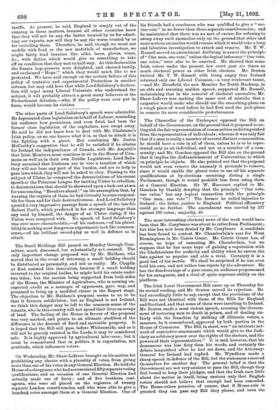The Chancellor of the Exchequer opposed the Bill on behalf
of the Government, on the ground that it proposed to ex- tinguish the fair representation of communities as distinguished from the representation of individuals; whereas it was only fair that if a man is really a member of several distinct communities, he should have a vote in all of them, unless he is to be repre- sented only as an individual, and not as a member of a com- munity; and Mr. Goschen opposed the Bill also on the ground that it implies the disfranchisement of Universities, to which on principle he objects. He also pointed out that the proposal would not even remove the anomaly it pretends to remove, since it would enable the plural voter to use all his separate qualifications at by-elections occurring during a single- Parliament, though it would prohibit him from using them at a General Election. Sir W. Harcourt replied to Mr. Goschen by blankly denying that the principle "One vote, one value," has any logical connection with the principle "One man, one vote " ! The former he called injustice to Ireland; the latter, justice to England. Political effrontery could go no farther. The amendment was carried by 237 against 189 votes; majority, 48.


































 Previous page
Previous page